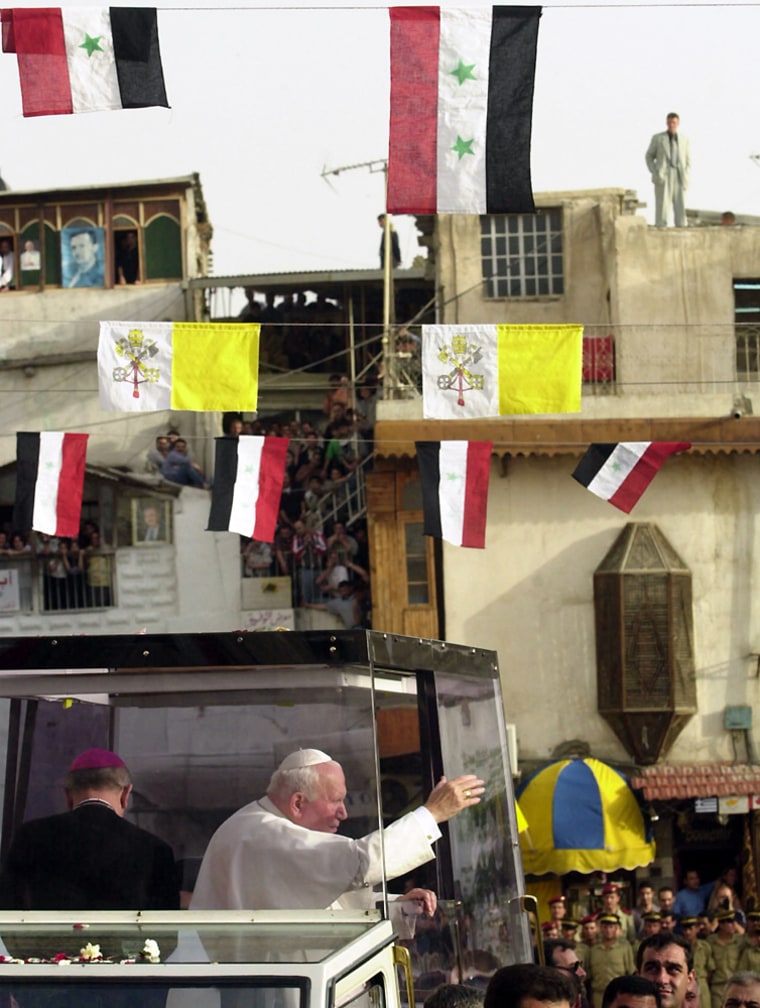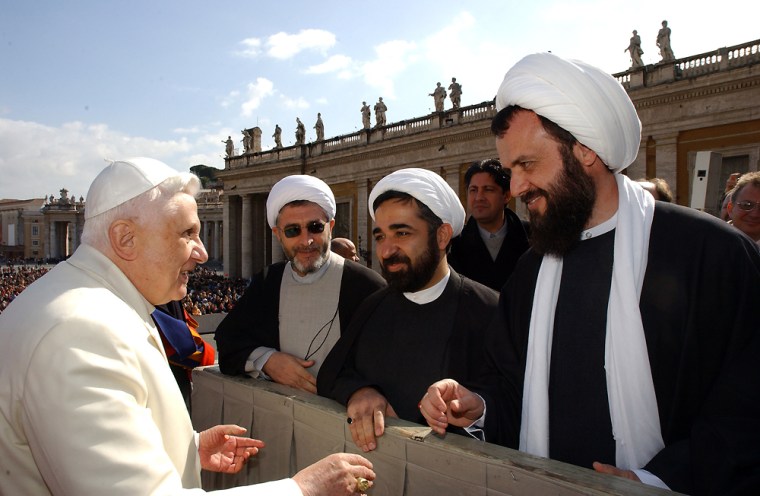ROME — The long reign of Pope John Paul II was marked by the dominant conflict of the age, the “Cold War,” a 40-year nuclear standoff between the West and the Soviet Bloc.
But that conflict ended in John Paul’s own lifetime, and the world that Pope Benedict XVI inherited is engulfed in a different, and in some ways more frightening, vortex of unpredictable violence, one that is sometimes characterized as showdown between Christianity and Islam.
Benedict, the former hard-line Cardinal Ratzinger, now has the formidable task of promoting religious tolerance in an volatile time of violence fueled by Islamic extremism.
Path set by John Paul
Pope John Paul was well aware of the increasing extremism in Islamic fundamentalism, and despite his well-publicized efforts to improve ties with the Jewish people by seeking forgiveness for their historical mistreatment at Christian hands, he also put a lot of effort and emphasis on the importance of Islamic relations.
During his year 2000 “Holy Year” pilgrimages to biblical places, John Paul was the first pope to ever enter a mosque, in Damascus, Syria.

John Paul reached out several times to religious and political leaders in the Arab and Muslim world to open and maintain dialogue, especially in places where Christian minorities were being discriminated or persecuted.
Because of these efforts he wasn’t caught flat-footed by the attacks of Sept. 11, 2001. He was shocked to be sure, like everyone else was, but he knew the dangerous playing field that spawned that aberration.
Pope Benedict coming from a different place
Benedict comes to this confrontation from a much different place.
Just like Karol Wojtyla’s views were colored by his Polish nationalism, so are Joseph Ratzinger’s. As an elderly German, he has lived long enough to have experienced a lot of European history first hand.
Benedict is renowned for his intelligence, and he presents his ideas in such clear and logical steps that his brilliance becomes obvious to anyone paying attention to his speeches. But his greatest strength is also a weakness because it colors his physical presence and demeanor as well.
He comes across as a man whose every gesture and mannerism is carefully thought out ahead of time, and strictly controlled.
In the cultural stereotyping that is part of life in modern Europe, he’s viewed by other nationalities as being “very Germanic,” with the expected traits of being highly ordered, disciplined, rigid and authoritative.
In his former role as Cardinal Ratzinger, he made a statement about Turkey that still haunts him now that he has taken over his new role as pope.
When asked about Turkey's effort to join the European Union by the French newspaper Le Figaro, he answered, "Turkey always represented another continent during history, always in contrast with Europe." In the widely reported interview, he went on to say that he was opposed to Turkey entering the EU “on the grounds that it is a Muslim nation.”
The former Cardinal Ratzinger seemed to see the entry of Turkey into the EU as a threat to the Christian tradition inherent in Western Europe.
The Turks were very angered by the comments and carried that resentment over with an initial objection to a papal visit to the country last fall. Private talks have smoothed things over and now the trip is back on again.
Different structure
But Muslim activists have taken advantage of his Turkish misstep to claim anti-Islamic feelings at the Vatican. And though that’s hardly the case here, it shows how hard it is to prove the absence of something, and the difficulties in dealing with a religion that lacks a hierarchical organization.
Islam is not a worldwide organization like the Roman Catholic Church, with a clearly defined local, regional, national and global chain of command topped by a general headquarters like the Vatican, whose top man is the pope.
Islam’s Mecca is a focal point for the prayers of millions of believers throughout the world who are themselves divided along various branches of interpretation and social custom. Though imams may be similar to priests or bishops, there is no “pope,” no elected “grand imam,” to whom they all report.
The very horizontal nature of organized Islam makes it hard for the pope and his deputies to know who and how to talk to them. Private communications and relationships have circumscribed value.
A positive negotiation on issues with the Muslim leadership in Cairo for example, won’t carry over to Iran or Saudi Arabia in any way, so the Vatican has to rely on its system of embassies and diplomatic channels, rather than a panel of Catholic experts on Islam sitting face to face with their counterparts.
Cartoon controversy
Public statements on the other hand, from the pulpit or the papal apartment window, risk coming across as incitements of the faithful. But, Pope Benedict chose a clever way to weigh in on the escalating violence over the Danish cartoons of the Prophet Muhammed that angered so many Muslims across the world.
Dozens of times a year new ambassadors to the Vatican begin their terms by the official “presentation of credentials” to the pope. Normally a brief 20-minute ceremony that garners little media interest, it is a still a part of the official public record of the pope’s statements and activities.
So without prior fanfare, on a Monday morning in February, the new ambassador of Morocco to the Holy See presented his credentials and got quite an earful in return.
His country hadn’t even had any violent demonstrations regarding the caricatures of the Prophet Muhammad, but his visit merely provided a pretext and venue for Benedict's first public remarks on the cartoon controversy.
Speaking in French he conceded that the cartoons were offensive and provocative.
"In the current international context, the Catholic Church remains convinced that to encourage peace and understanding between peoples and individuals it is necessary and urgent that religions and their symbols be respected, and that the faithful not be subjected to provocations injuring their outlook and religious feelings."
But he also made it clear that the violent reaction was not just wrong, but actually “unreligious.”
Benedict added that, "intolerance and violence are never justifiable responses to the offense (to religion), since they are not compatible with the sacred principles of religion."
Strong words for a pope, yet hardly strong enough to capture the attention of a jaded West, or soothe the burning emotions of a troubled Muslim world.
Moderates may be the answer
What may be a reflection of Ratzinger’s concern about the gravity of the situation is his very recent appointment of a new Vatican envoy to Egypt, and to the most comprehensive organization of Islamic countries, the 22-nation Arab League, based in Cairo.
The man is Archbishop Michael Fitzgerald, an Englishman who served for many years as Nigerian Cardinal Francis Arinze’s deputy at the Pontifical Council for Inter-Religious Dialogue.
He’s one of the top Islamist experts in the Catholic Church and made an interesting observation during a recent Reuters interview. "We have to persuade moderate Muslims to speak with those with more extremist views,” said Fitzgerald, adding “and similarly on the other side, people with more moderate views in the Western world have to speak with those who are more radically inclined, let's say, to (defend) the freedom of expression at all costs.”
That the moderates in each society should each take responsibility for trying to calm down their “own extremists” could actually be life-saving advice.
But it will always be a challenge in a media age where violence can be televised while it’s still happening, and anyone with a computer and a modem can insult millions with a keystroke.
